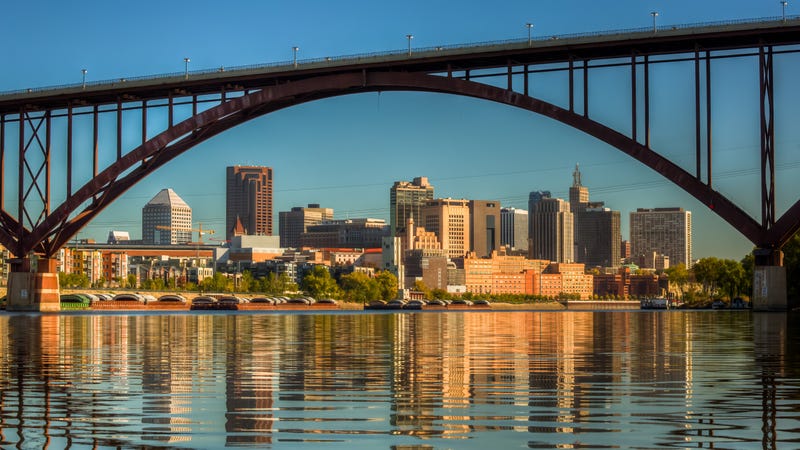
The thought of raising taxes is certainly one way to peek voters' interest ahead of Election Day and that is the case this year in St. Paul.
In WCCO Radio's final Behind the Ballot piece this week, WCCO Radio's Mark Freie looks at a proposed sales tax increase in St. Paul.
Proponents say the tax will generate nearly $1 billion over the next 20 years to repair roads and update city parks. Those against the idea say raising taxes will only push shoppers out of St. Paul, hurting businesses that are already struggling due to increased costs.
St. Paul voters will decide on Tuesday, November 7 whether or not to raise the sales tax by 1-percent. The ballot measure states that the city wants to establish the tax to generate $738,000,000 to repair and improve streets and bridges, $246,000,000 to improve parks and recreation facilities.
"A lot of conversations I've had with people are them talking about the potholes they've battled through the years, about growing up in St. Paul, and about the lifelong legacy as a community is the complaints about our streets," said St. Paul Mayor Melvin Carter. "I remind them that never have we as a community done the exercise to see what it would take to fundamentally improve the quality of the streets."
According to Carter, a sales tax is the most efficient way to go about addressing the city's street issues and maintaining park building facilities that have over $100 million in deferred maintenance.
"So if we did this through our property tax, only the folks that live inside the city would have the opportunity to chip-in and be a part of the solution," Carter said. "When we say we're going to do it through a sales tax, it broadens the scope of people to the full scope of people who are using our streets and parks. I think that's a fairer approach."
The sales tax proposal is receiving plenty of pushback, particularly from the St. Paul Area Chamber.
If approved, St. Paul's 9.875% sales tax would be the highest sales tax in Minnesota.
"This proposed sales tax has a potential of being catastrophic to the small business community and residents alike when you think about how this will set us apart as an island, and not in a good way," said B Kyle the president and CEO of the St. Paul Area Chamber.
While the main focus of the funding from the proposed sales tax is aimed at fixing up roads, Kyle believes it won't be nearly enough to make-up years of neglect.
"There's not doubt the roads need some significant capital investment, this is not a new problem," Kyle said. "Infrastructure investments have not been prioritized through the past several administrations. The delay in addressing it until this year has compounded the gap. The scale of the challenge was clearly identified to not only this administration, but to the previous administration. 2023 becoming the challenge, I would submit that this has been a challenge longer than that."
Hamline University political science professor David Schultz believes the $1 billion generated over two-decades won't successfully address the infrastructure issues.
"It's an insufficient amount of money to address infrastructure needs and it's a proposal that really doesn't get the city to be disciplined to do the right things it's suppose to be," Schultz said. "The City of St. Paul has really strayed far from its mission. City's core missions are about addressing issues such as infrastructure and public safety types of issues. The city in recent history has not done a very good job putting its tax dollars and revenues to address these core issues."
Carter says there is no argument against trying to fix St. Paul's streets.
"We haven't heard literally one single viable alternative proposal," added Carter. "If we want better streets we know we have to pay for them."
The St. Paul Area Chamber found that 73% of its members opposed the sales tax proposal. A similar number was found in a poll conducted by the Midway Chamber of Commerce.
"St. Paul business already have been subject to numerous new tax increases this year," Kyle said. "We can't look at the sales tax in a bubble. We have to look at it in a broader context of what this means for the survival of the business. We have to simply say enough. We can't afford this, we can't sustain this, and our business survival is at-risk right now."
St. Paul Public Works Director, Sean Kershaw, told WCCO Radio's Vineeta Sawkar that the money raised through a 1-percent sales tax increase would go beyond fixing potholes.
"What we need to do is fix our roads," Kershaw said. "The reason we have so many potholes is we have roads that are twice as old as they should be before you replace them."
Kershaw said the city spent over a week pothole patching Shepard Road over the summer. Crews will likely have to return in 18 months because of how bad the road is.
"This sales tax would help us permanently construct these roads and we could put the maintenance staff and resources we have into the rest of the city. These really important segments won't be falling apart like they are now."
